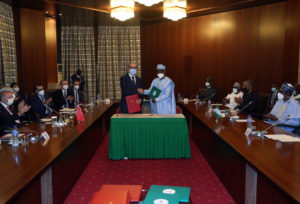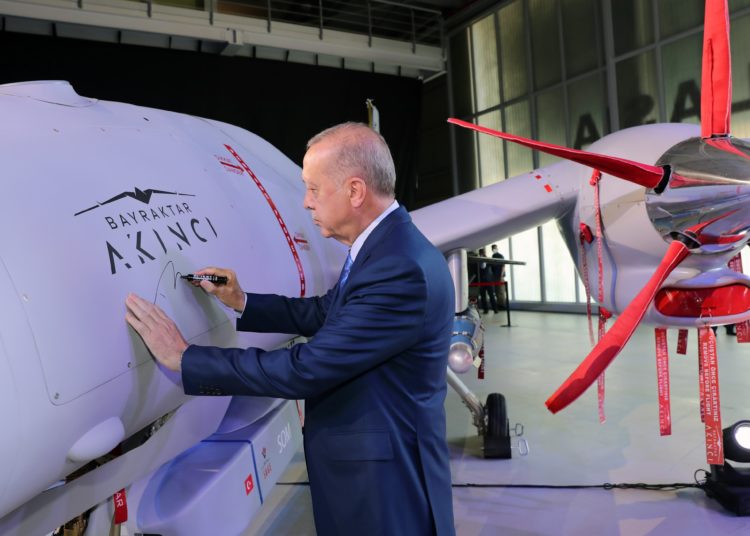Abdullah Bozkurt/Stockholm
Turkey’s top defense procurement agency, sanctioned by the US last year, continues to make deals with third countries in an effort to beat the American sanctions and show the world that the agency will not let itself be condemned as a pariah, a Nordic Monitor investigation has found.
Since the US designated the Presidency of the Defense Industry (Savunma Sanayii Baskanligi, SSB) as a sanctioned entity in December 2020, Turkey has managed to convince several countries to sign cooperation agreements with the SSB. The deals appear to be designed to show that the SSB can still operate under the sanctions and that senior SSB officials, also sanctioned by the US, can negotiate arms and defense agreements.
The latest agreement the SSB signed was with Nigeria, where President Recep Tayyip Erdoğan led a team of government officials and businesspeople on an official visit in October 2021. İsmail Demir, president of the the SSB, signed the bilateral defense industry cooperation agreement with Nigerian Foreign Minister Geoffrey Onyeama.
The US sanctioned the SSB and its senior officials over the purchase of Russian S-400 long range missiles, a deal worth $2.5 billion, from Rosoboronexport (ROE), Russia’s main arms export entity. The US stated that Turkey willfully engaged in a significant transaction with Russia and therefore was subject to sanctions under the Countering America’s Adversaries Through Sanctions Act (CAATSA).
The defense industry cooperation agreement between Turkey and Uzbekistan:
As a part the sanctions, the US also designated Demir, and three other SSB officials: Faruk Yiğit, SSB’s vice president; Serhat Gençoglu, head of the SSB’s Department of Air Defense and Space; and Mustafa Alper Deniz, program manager for the SSB’s Regional Air Defense Systems Directorate. Turkey had previously been removed from the global F-35 Joint Strike Fighter consortium in which the Erdoğan government had invested $1.4 billion and expected to generate $11 billion in export revenue.
Th sanctions on the SSB prohibit granting loans, credits and US export licenses and authorizations for any goods or technology transferred to the Turkish entity as well as loans or credits from US financial institutions totaling more than $10 million in any 12-month period. The US government would also oppose any third-party engagement with the SSB and try to block any loan that is likely to be extended to the SSB by international financial institutions.
The US started implementing sanctions on the SSB in April 2021, while President Erdoğan and SSB president Demir brushed them off, claiming that the restrictions will motivate the Turkish military and defense industry to produce more domestic arms and defense materiel and export more worldwide.

Nevertheless, concerned about the fallout from the US sanctions, the Turkish government scrambled to prop up the SSB. An agreement with Montenegro on defense industry cooperation, which was signed on November 17, 2017, was rushed to parliament for approval even though the government had been sitting on it for three years. The agreement was approved in fast-track deliberations in the relevant parliamentary committee and passed by the general assembly, coming into force on February 20, 2021.
That was followed by another international agreement the SSB had brokered with Uzbekistan on March 23, 2020. The agreement was signed by Demir and Oybek Ismailov, head of the State Committee for the Defense Industry of the Republic of Uzbekistan. The agreement is currently pending approval in the Turkish Parliament. In August 2021 Demir signed a defense industry cooperation agreement in Istanbul with Mohamed Saheb Al-Daraji, the chairman of Iraq’s Military Industrialization Board.
The carrot the Erdoğan government is dangling in negotiations to encourage defense industry cooperation deals that involve the sanctioned SSB is the possible sale of Turkish-made armed drones produced by a company owned by President Erdoğan’s son-in-law. Turkish defense technology company Baykar has sold its Bayraktar TB2 armed drones to Azerbaijan, Ukraine, Qatar and Libya.
The defense industry cooperation agreement between Turkey and Montenegro:
The company, which works closely with the SSB, has also come under sanctions by several countries. Canada suspended in 2020 and later blocked military arms exports to Turkey after a probe found Canadian drone technology had been misdirected for use in conflicts. Bayraktar drones also concerned dozens of US lawmakers who called on the State Department to suspend export licenses for US drone technology to Turkey in August 2021, pending an official investigation into the destabilizing role of Turkey’s drone programs in many parts of the world.
Turkey vowed to continue purchasing arms from Russia despite the sanctions and is reportedly involved in talks for the sale of the second batch of S-400 missiles. The Erdoğan government also entertained the idea of buying Russian fighter jets to replace its aging F-16 fleet if talks on purchasing and modernizing F-16s from the US fail.













